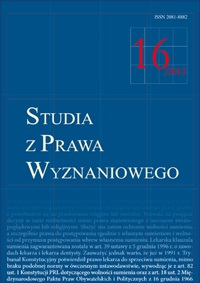Przyszłość zwolnień podatkowych dla związków wyznaniowych w świetle najnowszego orzecznictwa Sądu Najwyższego USA
Future of Tax Exemptions for Churches in the Light of the Recent United States Supreme Court Decisions
Author(s): Piotr MichalikSubject(s): Law, Constitution, Jurisprudence
Published by: Katolicki Uniwersytet Lubelski Jana Pawła II - Wydział Prawa, Prawa Kanonicznego i Administracji
Keywords: Supreme Court decisions; tax exemptions; churches; church – state relations; law on religion; freedom of religion
Summary/Abstract: For many years, the United States Supreme Court (SC) decisions in the field of tax exemptions for churches have remained unchanged. Still, their constitutional future is not clear. The main reason behind that is development of LGBT rights, guaranteed by the Equal Protection and Due Process Clauses of the Fifth and Fourteenth Amendments to the US Constitution. The recent SC decisions in Christian Legal Society Chapter v. Martinez from 2010, Hosanna-Tabor Evangelical Lutheran Church and School v. EEOC from 2012, and United States v. Windsor from 2013, show us the most possible directions in which the SC would enter into growing conflict between a full homosexual equality and religious freedom, guaranteed by the Free Exercise and Establishment Clause of the First Amendment to the US Constitution. According to the author, after the SC decisions in Martinez and Windsor it seems quite obvious that “homophobic” churches would have lost their tax exempt status under the provisions of Bob Jones University v. United States and Employment Division v. Smith. From the other hand – if only same-sex marriage would not have become universal in the USA – the unanimous decision in Hosanna-Tabor would have got “homophobic” churches out of the operation of Smith, in order to prevent them from abandoning their discriminatory tenets.
Journal: Studia z Prawa Wyznaniowego
- Issue Year: 2013
- Issue No: 16
- Page Range: 5-22
- Page Count: 18
- Language: Polish

